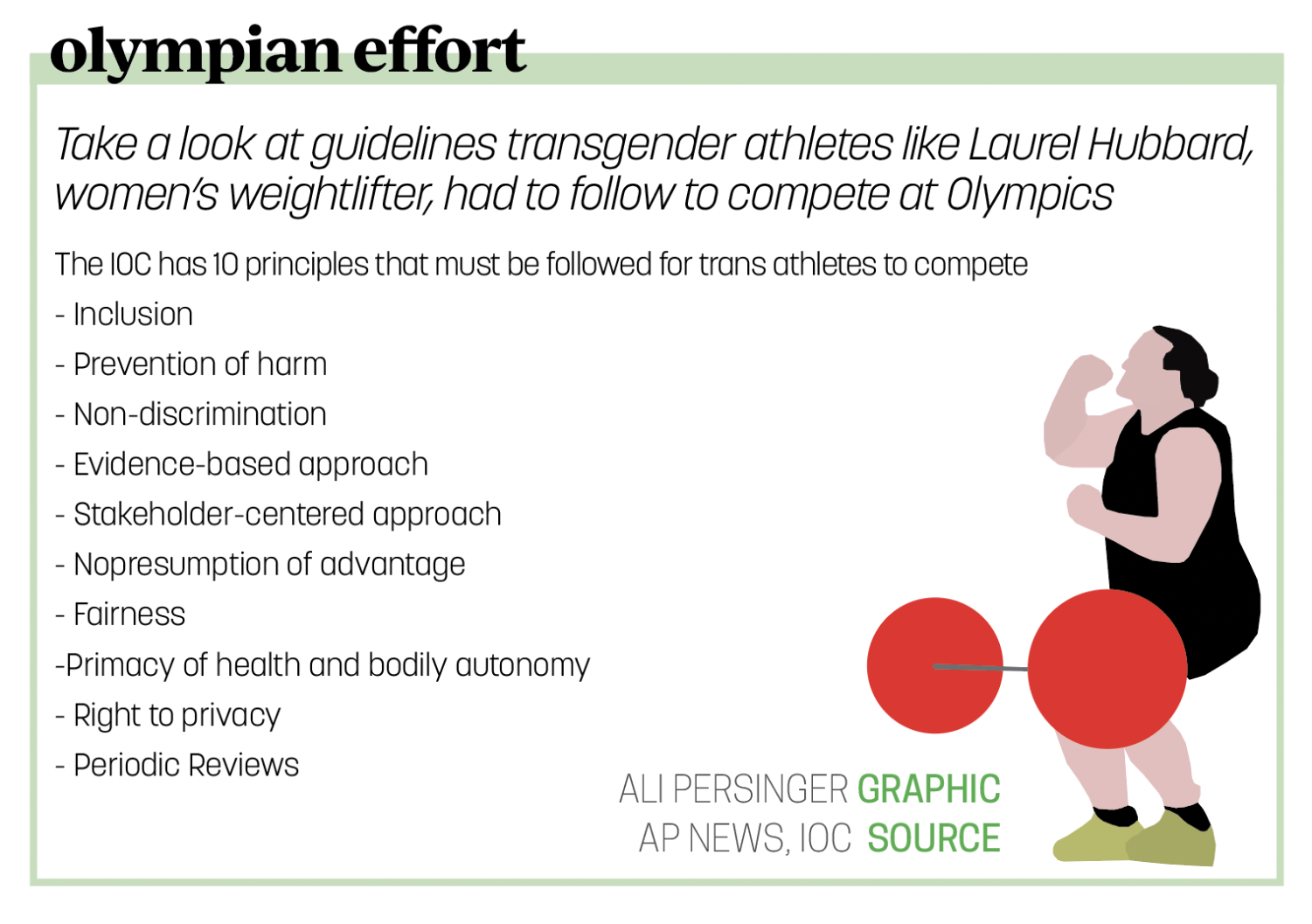Note: Governor Eric Holcomb vetoed the bill on March 21, citing concerns about the scope and writing of the bill and stating he found “no evidence” to suggest that there was an issue with transgender athletes in sports that needed further government intervention.
Last month, Indiana’s legislation passed House Bill 1041 and sent it to Governor Eric Holcomb’s desk for him to sign into law. The bill states that athletes must compete in sports that match their gender at birth, banning transgendered athletes from competing in sports that match their current gender identity. The bill has stirred much controversy.
Athletics Director Jim Inskeep said the bill will impact the school‘s athletic teams and has sparked a lot of conversation.
“As an IHSAA member school, we would follow the policy in place for student-athletes,” Inskeep said via email. “There is always the potential of legal filings from a number of parties that could impact the current policy or an amended policy based on HB 1041 passing.”
At this school, Lisa Venckus, women’s track and field member, rugby player, and senior, said she believes transgender athletes should be allowed to participate in sports that match their gender identity.
“In my opinion (the bill) is discrimination against a group that is already vulnerable and has to face a lot of backlash from society for just being who they are. It places a detriment on their mental and physical health,” Venckus said.
However, junior Allison “Allie” Wolf said she disagreed with this perspective and said there is no definite solution to this issue.
“[Allowing transgendered athletes to participate in the sport they identify as] kind of puts other biological females at a disadvantage,” Wolf said. “They are competing against people who maybe have the biological advantage of being born male where they have higher muscle mass and different hormones.”
Regarding that concern, Venckus said rules have already been put into place to ensure fairness.

“As far as high school sports go, there is a lot of concern over competitive advantages, but IHSAA already has policies to make sure there is fair competition. As far as younger kids, girls should be allowed to play on a girls team. It is as simple as that,” Venckus said.
The IHSAA policies Venckus mentioned exist across 16 states that allow participation within gender identification. They vary slightly by state, but most of the policies regard hormone therapy and transition, where athletes must be taking medically prescribed hormone treatment for a certain length of time and/or show evidence of no physiological advantages to other females.
In Indiana, for transgender youth to compete on a high school team, IHSAA rules require they prove they have been living as the gender they identify with for at least a year.
Additionally, according to the IHSAA, females must show evidence of surgical gender change in addition to hormone therapy, and cannot detransition and go back to participate in their birth-gender sports teams.
Examples of this idea are shown outside of K-12 as well. Wolf mentioned University of Pennsylvania swimmer Lia Thomas, who transitioned from male to female.

“She’s just totally dominating other athletes and it’s really frustrating for those athletes because they’ve worked their whole life and they have no chance against this other girl,” Wolf said.
Currently, the NCAA’s policy on gender identity in sports aligns with that of the Olympics, where athletes are allowed to compete so long as they show no evidence of physiological advantage.
However, on a less competitive high school level, fewer regulations are needed. Unified sports, for example, are often coed and centered around inclusion and do not have as much emphasis on competing.
Eric Li, Unified track member and junior, said coed sports offer opportunities for men and women that gender based sports do not.
“Coed sports are better because they are not excluding anyone,” Li said. “Everyone has an opportunity to run and make friends. In regular track the boys team is all boys and the girls team is all girls and they are excluding the other gender. In Unified track it is more comfortable because we are not excluding anyone and that is the best way to make friends and talk to others.”
While this topic is controversial, both Wolf and Venckus said this issue is complex.
I don’t know that I necessarily have a solution,” Wolf said. “You don’t want to ostracize those people and make them feel like they can’t compete or be athletes anymore, but having them compete and have that advantage is really unfair to other athletes.”
Venckus said being a part of the CHS Democrat Club has allowed her to voice her opinions and concerns and take part in rallies.
“We have definitely talked about it and there was a rally at the statehouse,’’ Venckus said. “We were able to go and support the ACLU (American Civil Liberties Union) and fight against this bill. Me and one other member of Dems were able to go to the rally and hear people talk about the bill and how it is affecting them.”

































![What happened to theater etiquette? [opinion]](https://hilite.org/wp-content/uploads/2025/04/Entertainment-Perspective-Cover-1200x471.jpg)













































![Review: “The Immortal Soul Salvage Yard:” A criminally underrated poetry collection [MUSE]](https://hilite.org/wp-content/uploads/2025/03/71cju6TvqmL._AC_UF10001000_QL80_.jpg)
![Review: "Dog Man" is Unapologetically Chaotic [MUSE]](https://hilite.org/wp-content/uploads/2025/03/dogman-1200x700.jpg)
![Review: "Ne Zha 2": The WeChat family reunion I didn’t know I needed [MUSE]](https://hilite.org/wp-content/uploads/2025/03/unnamed-4.png)
![Review in Print: Maripaz Villar brings a delightfully unique style to the world of WEBTOON [MUSE]](https://hilite.org/wp-content/uploads/2023/12/maripazcover-1200x960.jpg)
![Review: “The Sword of Kaigen” is a masterpiece [MUSE]](https://hilite.org/wp-content/uploads/2023/11/Screenshot-2023-11-26-201051.png)
![Review: Gateron Oil Kings, great linear switches, okay price [MUSE]](https://hilite.org/wp-content/uploads/2023/11/Screenshot-2023-11-26-200553.png)
![Review: “A Haunting in Venice” is a significant improvement from other Agatha Christie adaptations [MUSE]](https://hilite.org/wp-content/uploads/2023/11/e7ee2938a6d422669771bce6d8088521.jpg)
![Review: A Thanksgiving story from elementary school, still just as interesting [MUSE]](https://hilite.org/wp-content/uploads/2023/11/Screenshot-2023-11-26-195514-987x1200.png)
![Review: "When I Fly Towards You", cute, uplifting youth drama [MUSE]](https://hilite.org/wp-content/uploads/2023/09/When-I-Fly-Towards-You-Chinese-drama.png)
![Postcards from Muse: Hawaii Travel Diary [MUSE]](https://hilite.org/wp-content/uploads/2023/09/My-project-1-1200x1200.jpg)
![Review: "Ladybug & Cat Noir: The Movie," departure from original show [MUSE]](https://hilite.org/wp-content/uploads/2023/09/Ladybug__Cat_Noir_-_The_Movie_poster.jpg)
![Review in Print: "Hidden Love" is the cute, uplifting drama everyone needs [MUSE]](https://hilite.org/wp-content/uploads/2023/09/hiddenlovecover-e1693597208225-1030x1200.png)
![Review in Print: "Heartstopper" is the heartwarming queer romance we all need [MUSE]](https://hilite.org/wp-content/uploads/2023/08/museheartstoppercover-1200x654.png)



